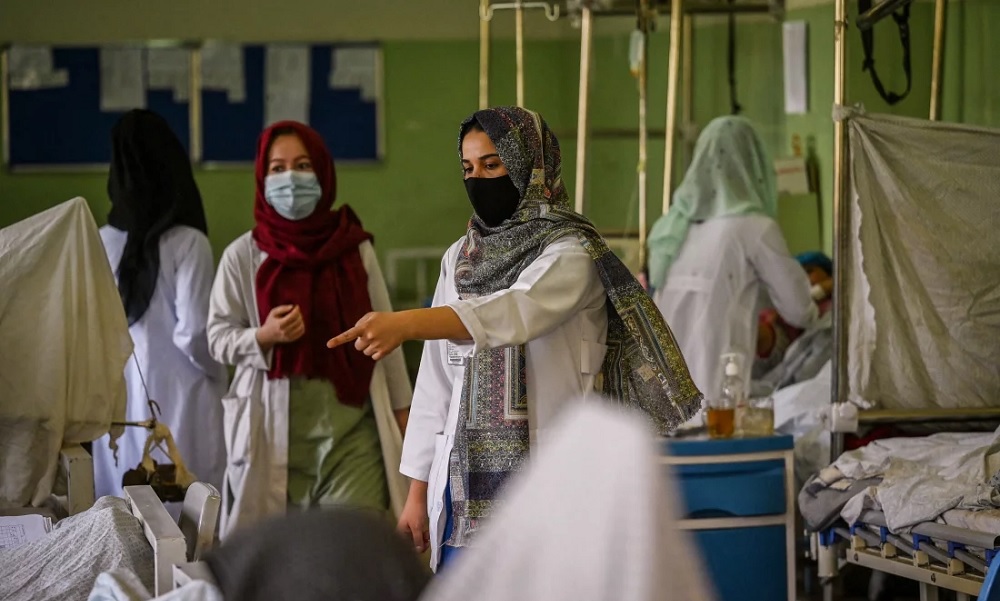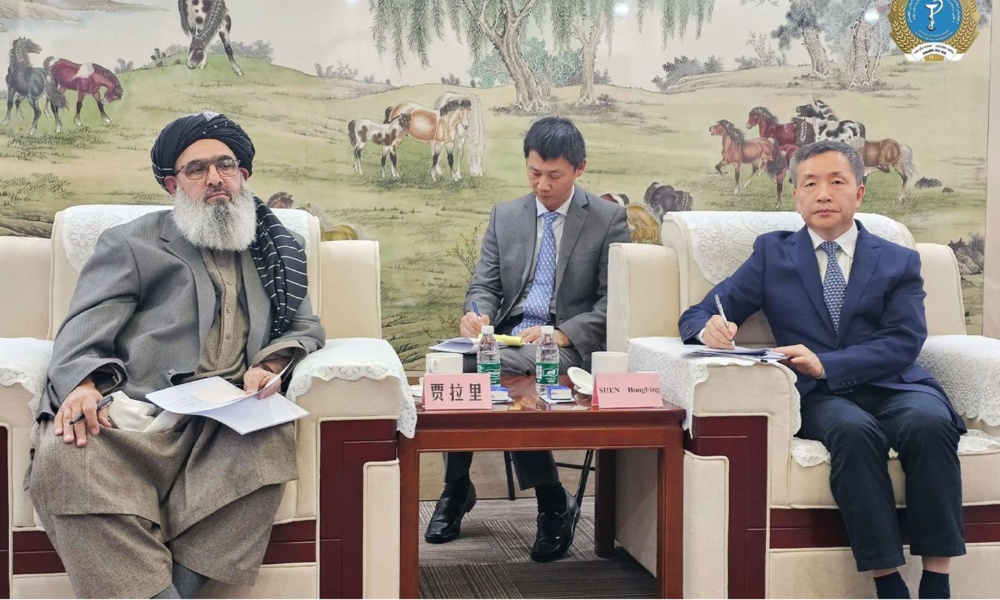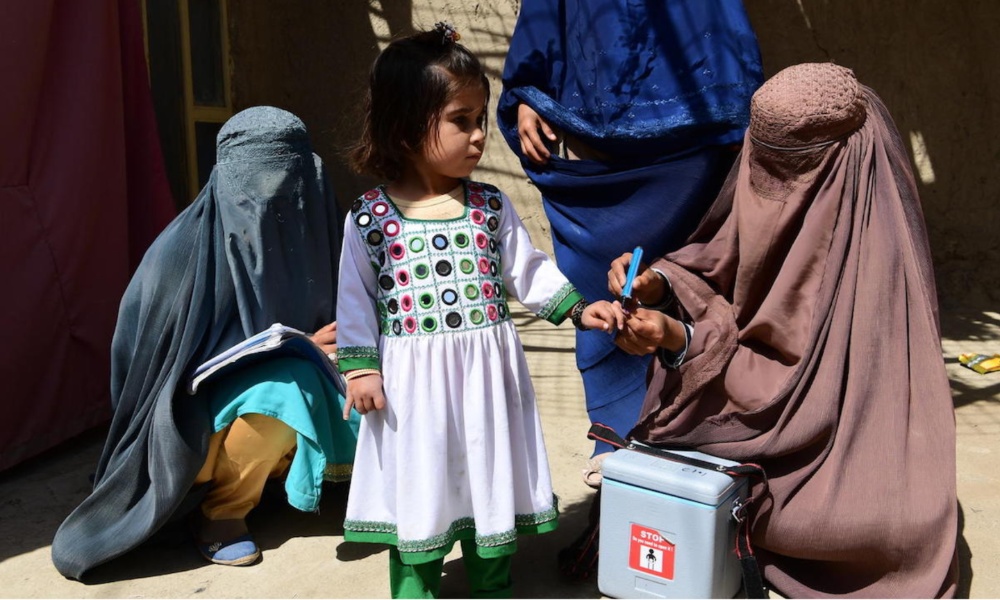Health
WHO’s chief calls for ‘engagement’ to prevent collapse of health sector

World Health Organization Director General Tedros Adhanom Ghebreyesus said on Thursday that the health system in Afghanistan is on the brink of collapse and called on the international community to engage with the new rulers, the Islamic Emirate of Afghanistan (IEA).
Giving a report back following his visit to Kabul this week, Ghebreyesus said: "In Afghanistan, we met with senior members of the Taliban (IEA) leadership, including the interim Prime Minister Mullah Mohammad Hasan Akhund. I believe that engaging the Taliban (IEA) leadership is essential if we are to support the people of Afghanistan.”
Ghebreyesus said that the health system in Afghanistan is on the brink of collapse.
"Over the past 20 years, significant health gains have been made in Afghanistan, in reducing maternal and child mortality, to end polio, and more. Those gains are now at severe risk, with the country’s health system on the brink of collapse,” he said.
According to him, almost 50% of children in Afghanistan are at risk of malnutrition and the country is facing an imminent humanitarian catastrophe unless urgent action is taken.
"There has been a surge in cases of measles and diarrhea; almost 50% of children are at risk of malnutrition; a resurgence of polio is a major risk; and 2.1 million doses of COVID19 vaccine remain unused,” Ghebreyesus said.
Ghebreyesus also raised his concern over the exodus of health workers from the country.
"Health workers are leaving, creating a brain drain that will have consequences for years to come,” said Ghebreyesus adding that “We visited a hospital where I met some nurses who have stayed. My heart broke when they told me they have not been paid in three months, but they said they would continue to serve their patients.”
Ghebreyesus also said that education is essential for protecting and promoting health in all countries, both in terms of health literacy, and for building the health workforce.
"The Taliban (IEA) leadership has announced that primary schools are open for boys and girls, and that they are preparing to open high schools to girls. In our discussions we offered to support that process, in partnership with other UN agencies,” Ghebreyesus said.
Ghebreyesus stated that at the moment the WHO’s priority is to support and sustain the health system in Afghanistan.
"The focus of our efforts now is to support and sustain the Sehatmandi project, which is the backbone of Afghanistan’s health system, providing care for millions of people through 2,300 health facilities, including in remote areas,” Ghebreyesus said.
He called on international donors to rapidly re-commit to finance the health system in Afghanistan and said the current pause in funding has resulted in only 17% of these facilities being fully functional at the moment.
He also said two thirds of all health facilities are out of stock of essential medicines.
“As a stop-gap measure, the UNCERF and the GlobalFund are financing WHO and our partners to ensure continuity of health services for the next three months. But this is simply not enough.
"WHO is calling on international donors to rapidly re-commit to finance Sehatmandi, as they have done for almost two decades. We simply can't abruptly halt support for life-saving health services for millions of Afghans at a time when they're most vulnerable,” he said.
Ghebreyesus also announced that WHO has now shipped more than 170 metric tons of medical supplies to Afghanistan in the past few weeks.
“We also need a reliable supply chain to be established urgently. WHO was the first agency to airlift essential medicines and supplies into Afghanistan, and we have now shipped more than 170 metric tons of medical supplies,” he said.
Afghanistan is now faced with a medicine shortage crisis due to disrupted border crossings and limited operation of banks along with the stoppage of foreign transactions.
Almost all medicine in Afghanistan is imported from neighboring countries, such as Pakistan, India, Bangladesh, Iran and Turkey.
However, the border crossings between Afghanistan and its neighbors were disrupted in the lead-up to the Islamic Emirate of Afghanistan’s (IEA) takeover, and normal operations are yet to resume.
Health
Excluding Afghan women from medical institutes threatens the future of health care in the country: MSF

The Islamic Emirate of Afghanistan’s (IEA) decision to bar women from studying in medical institutes will have far-reaching consequences for women’s health in the country, Médecins Sans Frontières (Doctors Without Borders) said on Friday.
This is another stage in the removal of women from public and professional life in Afghanistan. Already, there is an insufficient number of female health care workers in the country, impacting the availability of health care, especially given the separation of hospital wards by gender. New constraints will further restrict access to quality health care and pose serious dangers to its availability in the future, MSF said in a statement.
“There is no health care system without educated female health practitioners,” said Mickael Le Paih, MSF’s country representative in Afghanistan. “At MSF, more than 50 percent of our medical staff are women. The decision to bar women from studying at medical institutes will further exclude them from both education and the impartial provision of health care.”
The medical needs in Afghanistan are huge, and more female Afghan medical staff need to be trained to address them. For this to happen, women need to have access to education. Education restrictions for women and girls put in place in 2024, 2022, and 2021 considerably reduce the number of female medical staff in the future, MSF said.
“If no girls can attend secondary school, and no women can attend university or medical institutes, where will the female health professionals of the future come from and who will attend to Afghan women when they are at their most vulnerable?” said Le Paih. “For essential services to be available to all genders, they must be delivered by all genders.”
Recently, there have been reports that the leader of the Islamic Emirate has ordered the closure of medical institutes to women. The Islamic Emirate has not yet officially commented on this matter.
Health
Afghanistan’s health minister visits disease control center during China visit
Jalali, in China for the World Conference on Traditional Medicine 2024, said that traditional medicine in Afghanistan needs to be regulated and integrated into modern healthcare practices

Afghanistan’s Acting Minister of Public Health has held in depth discussions on managing diseases such as malaria, tuberculosis, and polio with China’s Deputy Director for Disease Control and Prevention, Shen Hongbing.
On an official visit to China, Mawlawi Noor Jalal Jalali also discussed other issues, with Shen and other officials, such as monitoring of diseases, disaster management processes and capacity building for Afghan healthcare workers.
Jalali, who was in China for the World Conference on Traditional Medicine 2024, also toured China’s Disease Control and Prevention Center (CDC) and its National Influenza Center.
The conference, which was held on Tuesday and Wednesday in Beijing, was jointly held by the World Health Organization (WHO) and Chinese sponsors, including China’s National Health Commission.
The opening ceremony of the two-day event was attended by health officials of governments and international organizations, experts and scholars, and deputies from medical institutions.
WHO Director-General Tedros Adhanom Ghebreyesus gave a speech via video.
Addressing delegates at the conference, the ministry cited Jalali as having said that traditional medicine in Afghanistan needs to be regulated and integrated into modern healthcare practices.
He also advocated for strengthened bilateral cooperation between China and Afghanistan to enhance capacity building, experience sharing, and joint research in the sector.
Afghanistan’s health ministry has meanwhile established a Traditional Medicine Department which is currently tasked with formulating policies and guidelines to regulate and improve this sector.
Health
WHO reports 283% increase in polio cases in Afghanistan this year
Since the last WHO Emergency Committee meeting, in July this year, 51 new wild polio cases were reported – 17 from Afghanistan and 34 from Pakistan – bringing the total to 62 in 2024

The World Health Organization (WHO) on Tuesday reported at an Emergency Committee meeting on the spread of polio that Afghanistan has recorded a 283% increase in polio cases in in the country this year.
According to a statement issued by WHO, since the last Emergency Committee meeting, in July this year, 51 new wild polio cases were reported – 17 from Afghanistan and 34 from Pakistan – bringing the total to 62 in 2024.
This represents a 283% increase in paralytic cases in Afghanistan and a 550% increase in Pakistan compared to all of 2023, WHO reported.
WHO stated there has been an upward trend of wild polio detection in Pakistan since mid-2023, mostly from Khyber Pakhtunkhwa, Sindh and Balochistan provinces.
In Afghanistan, there has been an increase mainly in the south since late last year 2023.
The emergency meeting to address the surge in polio cases was held on November 6, 2024, and chaired by the WHO Director-General. The statement however, was only released on Tuesday, December 3.
WHO noted that both countries had implemented two nationwide vaccination campaign rounds in 2024. Afghanistan has however implemented an additional four and Pakistan an additional six sub-national vaccination rounds.
“After very encouraging progress towards implementing house-to-house campaigns in all of Afghanistan during the first half of 2024, Afghanistan programme has recently gone back to implementing site-to-site modality campaigns.
“The Committee was concerned about this recent development, since site-to-site campaigns are not able to reach all the children in Afghanistan especially those of younger age and girls, which may lead to a further upsurge of WPV1 (wild polio) with geographical spread in Afghanistan and beyond,” the statement read.
WHO stated that in addition to seasonal movement patterns within and between the two endemic countries, the continued return of undocumented migrants from Pakistan to Afghanistan was compounding the challenges.
“The scale of the displacement increases the risk of cross-border poliovirus spread as well as spread within both the countries.
“This risk is being managed and mitigated in both countries through vaccination at border crossing points and the updating of micro-plans in the districts of origin and return. The programme continues to closely coordinate with IOM and UNHCR,” the statement read.
The organization emphasized the need for more comprehensive vaccination efforts to prevent further spread of the disease and for the international community to step up efforts to help the two countries eliminate the virus.
-

 Latest News4 days ago
Latest News4 days agoAfghanistan seals T20I series victory over Zimbabwe
-

 World5 days ago
World5 days agoSyrian clerics in former Assad stronghold call for national unity, democracy
-

 Latest News4 days ago
Latest News4 days agoU.S. sentences Afghan man to 30 years in prison for narco-terrorism and witness tampering
-

 International Sports3 days ago
International Sports3 days agoMessi vs Ronaldo: A look at their market values over the years
-

 Latest News4 days ago
Latest News4 days agoInvestment in Afghanistan’s pharmaceutical sector reaches $300 million: Union
-

 Latest News5 days ago
Latest News5 days agoChinese, Tajik officials discuss Afghanistan
-

 Sport4 days ago
Sport4 days agoAfghanistan’s Gulbaddin Naib fined 15% of match fee for dissent
-

 Regional4 days ago
Regional4 days agoHezbollah chief says group lost its supply route through Syria
























